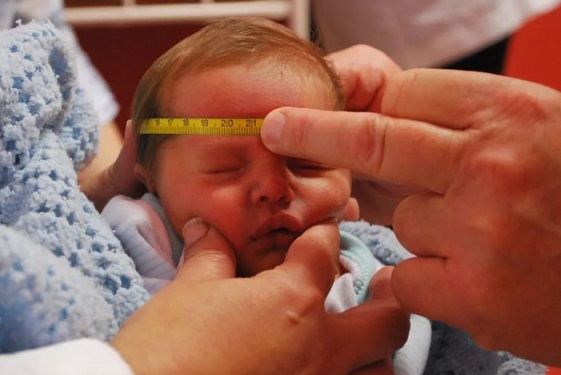U.S. Study Reveals Babies Born to COVID-19 Infected Mothers in Late Pregnancy Have Smaller Heads and Developmental Risks!
Nikhil Prasad Fact checked by:Thailand Medical News Team Apr 01, 2025 1 day, 6 hours, 44 minutes ago
Medical News: A new American study has raised serious concerns about the long-term health of infants born to mothers who contracted COVID-19 during the later stages of pregnancy. According to the research, babies born to mothers infected with SARS-CoV-2 during their third trimester tend to have significantly smaller head circumferences at birth - a potential marker for underlying neurodevelopmental issues.
 U.S. Study Reveals Babies Born to COVID-19 Infected Mothers in Late Pregnancy Have Smaller Heads
U.S. Study Reveals Babies Born to COVID-19 Infected Mothers in Late Pregnancy Have Smaller Heads
and Developmental Risks!
The study was conducted by researchers from UConn Health's Department of Obstetrics & Gynecology, the University of Connecticut School of Medicine, the Cato T. Laurencin Institute for Translation in Regenerative Engineering, and Perinatal Pathology Consulting in Atlanta. The study's alarming findings underline an urgent need for ongoing monitoring and further research into the long-term impact of COVID-19 on fetal development. This
Medical News report is based on detailed data drawn from a retrospective cohort study involving nearly 300 pregnant women.
Small Head Size Without Other Signs of Growth Restriction
The research team enrolled 140 COVID-19-positive pregnant women and compared their newborns to 136 infants born to uninfected mothers, all of whom gave birth between April 2020 and December 2022. Researchers meticulously tracked newborn metrics like birth weight, length, and - most crucially - head circumference.
While no significant differences were noted in the babies' weight or length, the study found that those born to mothers who had contracted COVID-19 during the third trimester exhibited smaller head circumferences. Specifically, third-trimester infection was associated with a reduction of approximately 0.38 standard deviations in head size compared to uninfected pregnancies, a statistically significant difference (p = 0.024).
Importantly, these reductions occurred without signs of small for gestational age (SGA) - a standard diagnosis for underweight or undersized babies - and without changes to the Ponderal Index, which measures overall body proportionality. This suggests that the reduced head size is a distinct and potentially isolated effect, raising red flags about potential neurological implications.
Why Head Circumference Matters
Head circumference (HC) is a critical indicator of brain development in utero. During the third trimester, fetal head growth is particularly rapid, with HC increasing by nearly 0.7 to 1 millimeter per day. Any interruption in this growth pattern - especially without accompanying signs of generalized growth restriction - suggests that the virus may have a targeted impact on the brain.
The researchers propose that the neurotropic nature of the SARS-CoV-2 virus may be at play here. Prior studies have shown that COVID-19 can cross into the central nervous system by compromising the blood-brain barrier and infecting pericytes and astrocytes. Autopsy studies on pa
tients who died from COVID-19 revealed various neurological abnormalities, including white matter changes and cerebral hemorrhages. There have even been documented cases of severe fetal brain damage in pregnancies complicated by critical maternal COVID-19 infections.
Study Methods and Scope
The study was carried out at an academic tertiary hospital in the Northeastern United States and approved by the UConn Health Institutional Review Board. It included only singleton pregnancies confirmed by PCR tests and excluded pregnancies with fetal anomalies or losses before 15 weeks.
The researchers collected data via the secure REDCap platform and used sophisticated statistical models to adjust for variables like gestational age, maternal comorbidities, and demographic differences. Head circumference percentiles were standardized based on the 2013 Fenton Preterm Growth Charts and compared using z-scores.
Interestingly, no significant differences were found in the length of hospital stay, delivery methods, gestational age at birth, or NICU admissions across the groups. This further isolates reduced head size as a unique and possibly virus-specific effect rather than a result of generalized complications during pregnancy.
Parallels to Zika and Other Viruses
The findings evoke alarming parallels to Zika virus infections, which became infamous for causing microcephaly in infants. Like SARS-CoV-2, Zika targets neural stem cells, leading to disrupted brain development and lasting neurological consequences. While the current study did not find outright microcephaly (typically defined as HC two standard deviations below the mean), the reduced head sizes in third-trimester COVID-19-exposed infants may reflect subtler yet still serious impairments.
The authors emphasize that while familial traits and genetics play a role in head size, the consistent pattern found only in third-trimester exposures supports a viral effect rather than random variation. They stress that more data is urgently needed - particularly longitudinal follow-up of these infants to assess cognitive, motor, and behavioral outcomes over time.
A Call for Continued Vigilance and Research
In conclusion, the study adds to a growing body of evidence suggesting that even asymptomatic or mild COVID-19 infections in pregnancy may have lingering effects on newborns, especially when contracted during the crucial late stages of fetal brain development. The research team calls for expanded studies to include factors like parental head size, placental pathology, and long-term developmental tracking of children.
While the overall incidence of small head size was modest, the implications are not. Even slight deviations in neonatal brain growth metrics can herald more serious issues down the road. Thus, clinicians and expecting mothers alike should remain cautious and proactive in managing pregnancies affected by COVID-19.
The study findings were published in the peer-reviewed journal: Biomedicines.
https://www.mdpi.com/2227-9059/13/4/832
For the latest COVID-19 News, keep on logging to Thailand
Medical News.
Read Also:
https://www.thailandmedical.news/news/new-alarming-case-shows-omicron-and-newer-sars-cov-2-strains-can-still-damage-placenta-in-pregnant-women
https://www.thailandmedical.news/news/covid-19-news-study-shows-that-exposure-to-sars-cov-2-during-pregnancy-results-in-newborns-developing-epigenetic-changes
https://www.thailandmedical.news/news/breaking-news-offspring-of-pregnant-women-with-covid-19-will-likely-have-altered-brain-developments-especially-males
https://www.thailandmedical.news/pages/thailand_doctors_listings
https://www.thailandmedical.news/articles/hospital-news
